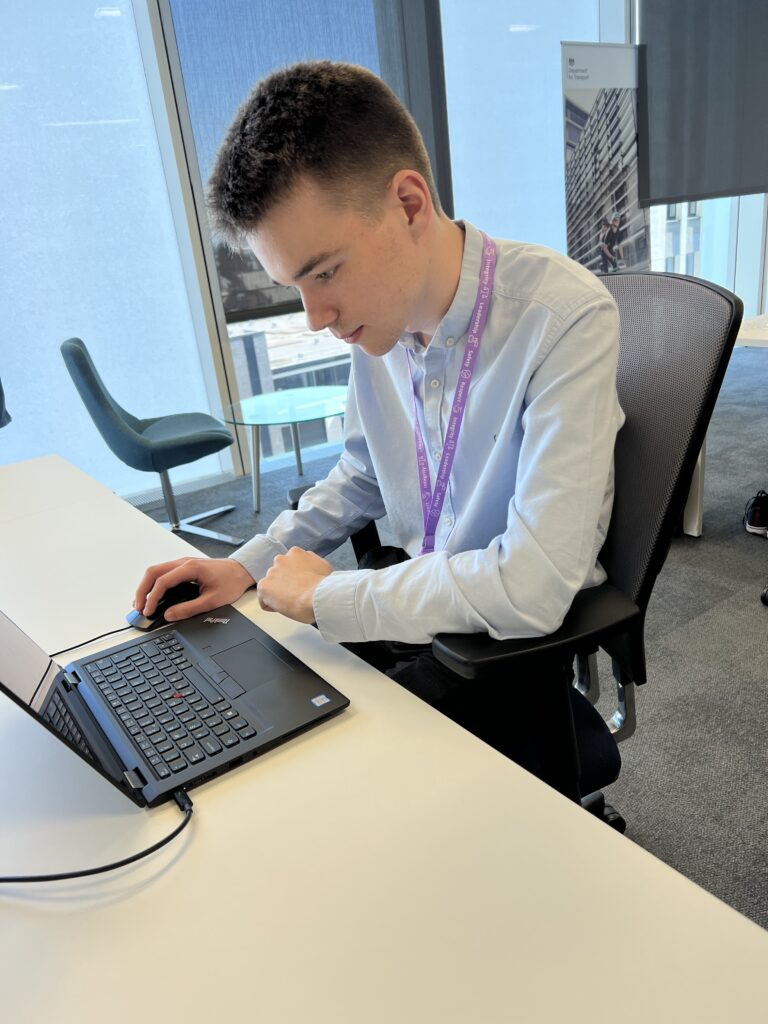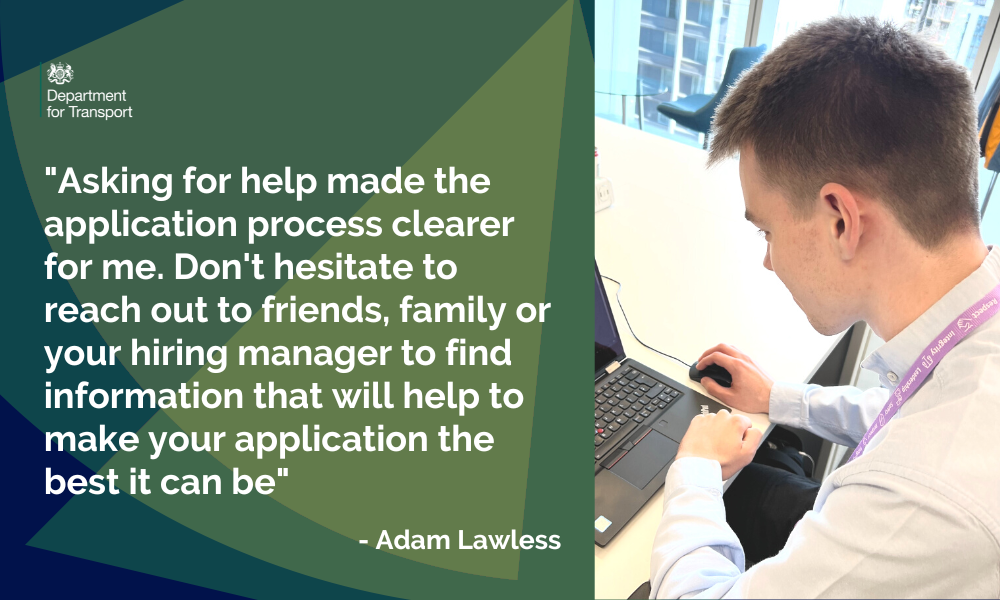The end of August is a crucial time for many young adults in the United Kingdom. As students across the country receive their A-Level and GCSE exam results, they reach a crossroads about which career path to follow.
Though some students will be focused on heading to University, others will aim to build an early career through apprenticeships. DfT Apprenticeships offer young people the opportunity to immerse themselves in the world of work straight after school, allowing them to work towards their qualifications while earning a living.
We caught up with Adam Lawless, an 18-year-old Policy Apprentice who started his role in the Department for Transport two weeks after completing his A-levels. Adam is loving his Apprenticeship experience as a Strategy & Communications Lead, and he’s not looking back!
Keep reading to get a peek into his experience; from leaving school, to why he chose to apply for his role, and his day-to-day as a Policy apprentice. Adam also shares his top tips for applying for an apprenticeship position.

From A-level student to the Civil Service: Adam’s journey to becoming a DfT Policy Apprentice
Hi Adam! Tell us about your background and how you came to join DfT as a Policy Apprentice…
I joined the Department for Transport just two weeks after completing my A-levels, which included studying English, Geography and History. If I’m honest, making the transition from education to work would not have been easy if it wasn’t for building up some professional experience beforehand. At school, I led an organisation called ‘Asia Elects’. I was dedicated to sharing and analysing election results across Asia. The skills I developed, including handling multiple workloads and tight deadlines, were incredibly helpful in giving me the confidence and experience to apply for the apprenticeship role.


Adam, you had offers from the likes of Oxford University. What led you down the Policy Apprenticeship route over university?
Going for an apprenticeship was a very simple choice for me. For the last two years, I wanted to be a Civil Servant, specifically with the aim of developing a career in Policy. This apprenticeship provides the perfect opportunity to begin developing the skills required in the profession. The more difficult aspect was trying to convince those around me, whether family or friends, that this was a better option than Oxford University (my firm choice).
For me, the benefits of an apprenticeship far outweigh a university degree. Of course, one of the most glaring advantages would always be the pay! Getting paid whilst learning? It couldn’t get better than that, surely.
Receiving a salary has allowed me to live independently. Right now, I’m comfortably renting a little studio flat. I have freedom and space, and I can invite friends over as and when I please. Overall, I will never regret turning down university because this apprenticeship is allowing me to start my career years before I ever thought was possible.
What particularly made you want to become a Policy Apprentice?
I didn’t expect to become a Strategy & Communications Lead for the Bus Open Data team. Originally, I applied on a campaign of Policy Apprentices for the Department for Transport, but I have come to absolutely love the sector I’m a part of. Buses are such a complex and wide-ranging policy area, and while I am only a small cog in a much bigger machine, learning about it all has been fascinating.
What has the best part of your apprenticeship been so far?
The best part so far has been meeting the various tech companies and local councils behind large-scale transport projects. These projects include the design of up-and-coming, innovative Journey Planning apps that use the data produced by my team. Seeing the real-world impact of my team has been completely invaluable and makes my work worthwhile.

The Application Process: Policy Apprenticeship
Tell us a little bit about your application process. What helped you to succeed?
There were several stages that made up my application process. This included:
- A personal statement
- A written exercise
- An interview
The Personal Statement
The process started with writing a 750-word personal statement in which I focussed on aligning my response with the criteria outlined. Taking the time to read the job advert and tailor my statement accordingly ensured that I used the word count appropriately to provide evidence against what the hiring manager was looking for in my application.
The Written Exercise
Upon passing that successfully, I then completed a written exercise. We were given a range of documents about clothes taxes and then had to draft a policy briefing to a Minister, offering a final recommendation. Doing preliminary research on what a policy recommendation looked like certainly helped give me direction on what I needed to produce.
The Interview
Finally, there was an interview in which I was asked questions about my previous experience and the strengths I could bring to the role.

Adam’s advice to those applying to become a Policy Apprentice at DfT
- Make your application specific to the role. Tailoring your application to the job advert and role profile will help you to show the hiring manager why you’re the perfect fit for the role. Be sure to read up on DfT’s How We Hire guidance to find application tips and more detailed information about what to expect when applying for a role in the DfT.
- Talk about your hobbies and interests. Don’t be afraid to draw upon any experience you may have, whether this is hobbies, interests, volunteering or education if it helps you to meet the application criteria.
- One word – STAR. The key is to use the STAR method when responding to behaviour-based interview questions. It stands for Situation, Task, Action and Results. This Civil Service guidance will help you better understand how to apply STAR in your interview technique.
Ready to earn while you learn?
Deciding what to do after your GCSEs or A-levels can be tough. DfT offers fantastic opportunities to immediately enter the world of work and gain valuable on-the-job experience while earning a salary.
If you’re ready to start your career right now, an Apprenticeship at DfT will give you the opportunity to further your qualifications and develop technical or business skills. All this, while supporting the transport network that helps UK businesses, people and goods travelling around the country.
Don’t wait, look into it now!
Commercial Apprenticeship
Applications launching 12th September 2022!
Applications for DfT’s Commercial Apprenticeship Route (CAR) will open on Monday 12th September 2022




